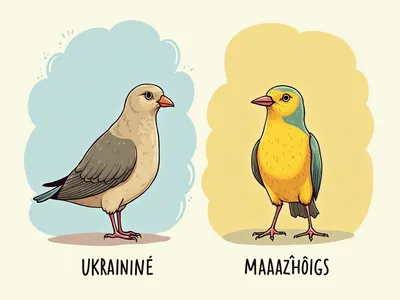
How can I avoid mistakes with false friends when learning Ukrainian
False friends when learning Ukrainian: How can I avoid mistakes with false friends when learning Ukrainian
Avoiding mistakes with false friends when learning Ukrainian requires awareness of these linguistic traps and consistent practice. False friends are words that look or sound similar in two languages but have different meanings. Here are some strategies and examples to help you navigate them effectively:
Strategies to Avoid Mistakes:
-
Learn Common False Friends:
- Familiarize yourself with frequently encountered false friends between Ukrainian and your native language. For example:
-
Contextual Learning:
- Always learn words in context rather than in isolation. This helps you understand their correct usage and avoid confusion.
-
Use Flashcards:
- Create flashcards with the Ukrainian word, its meaning, and a sentence example to reinforce its proper usage.
-
Practice with Native Speakers:
- Engage in conversations with native speakers who can correct you when you misuse a word.
-
Refer to Reliable Resources:
- Use trusted dictionaries or language learning platforms that highlight false friends and provide accurate translations.
-
Take Specialized Language Courses:
- Enroll in courses that focus on the nuances of the Ukrainian language, such as distinguishing false friends 2.
-
Be Patient and Persistent:
- Mistakes are a natural part of learning a language. Regular exposure and practice will help you internalize the correct meanings over time.
Examples of False Friends in Ukrainian:
-
Mist:
- In Ukrainian, “міст” (mist) means “bridge,” while the English word “mist” translates to “туман” (tuman) in Ukrainian 1.
-
Sympathy:
- The English word “sympathy” translates to “співчуття” (spivchuttia) in Ukrainian, while the Ukrainian word “симпатія” (sympatiya) refers to liking or attraction 1.
-
Meeting:
- In Ukrainian, “мітинг” (mityng) refers to a protest or rally rather than a formal meeting 2.
-
Costume:
- The word “костюм” (kostium) in Ukrainian often means a suit rather than a costume for Halloween or performances 5.
By actively incorporating these strategies into your learning routine and paying attention to common false friends, you can significantly reduce errors and improve your fluency in Ukrainian.